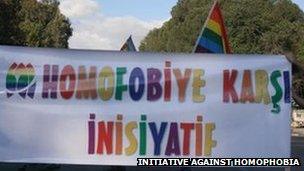Alarm after arrests in north Cyprus under gay sex law
- Published

Gay rights campaigners have been trying to overturn Section 171 for years
Euro MPs have voiced alarm after two men were arrested in Turkish-controlled northern Cyprus under a British-era law criminalising gay sex.
On Sunday, two inmates at the central prison in Nicosia appeared in court charged with having "sexual intercourse against the order of nature".
Gay sex is not a crime in either Turkey or the Republic of Cyprus.
Amid local fears of a crackdown on gay people, MEPs urged the Turkish Cypriot authorities to repeal the law.
Marina Yannakoudakis, a British Conservative MEP, said Turkish Cypriot leader Dervis Eroglu had given assurances that he would sign a repeal of the ban into law.
However, the repeal is still to be debated in parliament in northern Cyprus despite repeated requests by gay rights lobbyists, local group Initiative Against Homophobia told the BBC News website.
Mr Eroglu has not yet responded to a request by the BBC for comment.
'Only in words'
Sunday's court appearance marks the third occasion in eight months when arrests have been made based on Section 171 of the penal code.
Section 171 carries a punishment of five years for homosexual acts.
Introduced in 1929, it was effectively repealed in the Republic of Cyprus in the late 1990s after a European Court of Human Rights (ECHR) rulin, externalg.
But in the Turkish-controlled north, it was used to justify the arrest in July of two men, the gay rights group Shortbus Movement reports.
Then, in October, a former Republic of Cyprus finance minister, Michael Sarris, and two other adult men were arrested.
Mr Sarris crossed the border back into the Republic of Cyprus, thereby escaping prosecution, but the two other men remain under investigation in the north, according to the Intergroup on LGBT (Lesbian, Gay, Bisexual and Transgender) Rights at the European Parliament.
Following the arrest of Mr Sarris, the Turkish Cypriot leader said he had advised the government that Section 171 "should be abolished without delay".
He noted that one of the political parties, Communal Democracy, had submitted a bill on its repeal to the territory's general assembly on 25 October.
However, according to Initiative Against Homophobia (IAH), the bill has not been debated.
"The repeal stayed only in words - no further action has been taken," IAH's Reshat Shaban told the BBC News website.
Moratorium demand
Mr Shaban said arrests under Section 171 had increased "significantly" last year and he feared a campaign was under way to influence public opinion against gay people.
"The recent arrests create a certain understanding that LGBT people may be arrested at any time under laws which were found incompatible with human rights by the ECHR," he said.
The government in the north was not accountable to any international institutions, he pointed out.
Furthermore, some local media had published names and pictures of suspects despite closed court hearings, he said.
Marina Yannakoudakis, who is a member of the European Parliament's High-Level Contact Group for Relations with the Turkish Cypriot Community, was also concerned about the "extremely derogatory tone" in which local Turkish-language media reported the arrests.
The Conservative MEP said the Turkish Cypriot leader had to make good his promises of last year.
"There must be an immediate moratorium on arrests under Section 171 and the men arrested last month must be released without delay," she said.
"Draft legislation submitted by the Communal Democratic Party must be fast-tracked through the assembly to ensure that there are no further miscarriages of justice and Dr Eroglu must keep his promise to sign the repeal into law.
"It is important not only to change the laws in the north part of Cyprus, but to change attitudes to ensure that all Cypriot adults may engage in consensual sex - be it with the same or different gender - without fear of punishment or pillory."
British Labour MEP Michael Cashman, who jointly heads the Intergroup on LGBT Rights, said Section 171 "wrecked lives".
He said he planned to visit Cyprus to meet Mr Eroglu and others in order to "encourage repealing this outdated piece of legislation which has no place in Europe - or anywhere in the world".